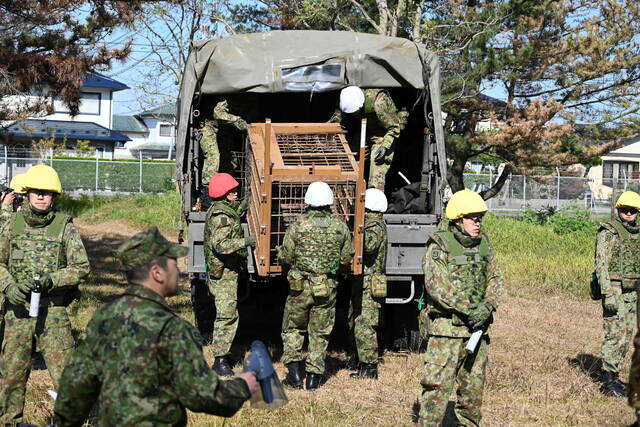https://triblive.com/news/world/japan-sends-troops-to-northern-region-to-help-stop-bear-attacks-after-a-record-number-of-casualties/
Japan sends troops to northern region to help stop bear attacks after a record number of casualties

TOKYO — Japan’s Defense Ministry sent troops on Wednesday to the northern prefecture of Akita to help contain a surge of bear attacks that have horrified residents in the mountainous region.
Bears have showed up near schools, train stations, supermarkets and even a hot springs resort, with attacks by the animals reported almost daily across Japan, mostly in the north.
Since April, more than 100 people have been injured and at least 12 killed in bear attacks across Japan, according to Environment Ministry statistics at the end of October.
Troops to help with traps
“Every day, bears intrude into residential areas in the region and their impact is expanding,” Deputy Chief Cabinet Secretary Fumitoshi Sato told reporters. “Responses to the bear problem are an urgent matter.”
The Defense Ministry and Akita prefecture signed an agreement on the troop dispatch on Wednesday afternoon, allowing soldiers to set box traps with food inside, transport local hunters and help with the disposal of dead bears. The soldiers will not use firearms to cull bears, officials said.
Akita Gov. Kenta Suzuki said local authorities were getting “desperate” due to a lack of manpower amid daily reports of bear attacks.
Defense Minister Shinjiro Koizumi said Tuesday the bear mission aims to help secure people’s daily lives, but that Self Defense Force service members’ primary mission is national defense and they cannot provide unlimited support for the bear response. The Japanese SDF is already understaffed.
So far, the ministry has not received other requests for troop assistance over the bear issue, he said.
Akita is worst-hit
In Akita prefecture, which has a population of about 880,000, bears have attacked more than 50 people since May, killing at least four, according to the local government. Experts say 70% of the bear attacks have occurred in residential areas.
An elderly woman who went mushroom-hunting in the forest was found dead in an apparent bear attack over the weekend in Yuzawa City in the prefecture. Another elderly woman in Akita city encountered a bear while working on a farm and was killed in late October. And a newspaper delivery man was attacked by a bear and suffered an injury in Akita city on Tuesday.
Declining population part of problem
Experts say Japan’s aging and declining population in rural areas are among the reasons for the growing bear problem in recent years.
Abandoned neighborhoods and farmland with persimmon or chestnut trees often attract bears to residential areas. Once bears find food and acquire a taste, they keep coming back, experts say.
Local hunters are also aging and not used to bear hunting. Experts say police and other authorities should be trained as “government hunters” to help cull the animals.
The government set up a taskforce last week to create an official bear response by mid-November. Officials are considering bear population surveys, the use of communication devices to issue bear warnings and revisions to hunting rules. They also say experts should be trained in hunting and ecology.
The lack of preventive measures in the depopulated and aging northern regions have also led to an increase in the populations of brown bears and Asiatic black bears, the ministry said.
Copyright ©2026— Trib Total Media, LLC (TribLIVE.com)
